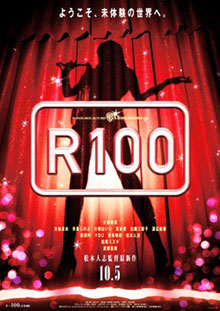AFI Fest 2013 Film Review: R100

Satoshi Matsumoto’s surreal R100 literally starts off with a kick to the teeth and shuffles along from one hilariously cringeworthy sadomasochistic encounter to the next in what is a bizarre midnight mash-up of film noir, 70s B-movie exploitation and Japanese Kaiju (monster film).
R100 initially unfolds like a Lynchian mystery: a middle class everyman and an alluring femme fatale brought together by a primal scene of sexually tinged violence. Takafumi Katayama (played straight and hopeless by Nao Omori of Ichi the Killer), is a disciplined salaryman in the home furniture section of a department store. In order to sustain his secret extreme bondage fetish, Takafumi enlists a mysterious agency called Bondage (as subtle as it gets) to arrange for leather clad dominatrixes (a hilarious troupe pooled from well-known Japanese actresses and comediennes) to appear at random intervals in order to inflict the lash and all other deeds of debauchery.
One hilarious encounter involves Takafumi at a sushi counter. As each plate is prepared to order a dominatrix palm-smashes the dish and one by one Takafumi is forced to eat the flattened sushi in front of a disconcerted chef and patrons. But the tone quickly shifts from S&M sex comedy to sobering melodrama. We learn that Takafumi’s wife is in a coma (for reasons undisclosed), unlikely to awake and sorely missed by a pre-tween son who doesn’t understand the seriousness of his mother’s condition.
At first Takafumi’s daily bouts with dominatrixes seem like a welcome escape and an ecstatic distraction from life’s anxieties, a point hit on the head by Takafumi’s cheesy CGI halo/grin that appears when the pain/pleasure principle reaches its pinnacle. But when the Bondage agency oversteps its boundaries into Takafumi’s work and home life, he tries to call it quits. It turns out however that the agency (managed by a brilliantly diabolical Suzuki Matsuo) is in fact a shady corporation with evil intentions. R100 quickly devolves into B-movie exploitation territory as all manners of plot tangents, cheesy effects and random new characters take over.
The story is all downhill at this point but Matsumoto purposefully derives pleasure from the film’s incongruence. Several times the reel seemingly stops and we’re treated to a scene of dumbfounded Japanese censorship board members leaving a preview screening of R100 (R100 is a play on the ratings system, denoting admittance only to those 100 years or older). The sensors smoke in nauseating silence and eventually voice their concerns for the haphazard continuity errors and bizarre plot before shuffling back in for another unnerving reel.
There is a thesis to Matsumoto’s madness, however. The submissive behaviour that Takafumi paradoxically derives pain and pleasure from is analogous to the very affliction suffered by contemporary Japan. In its race towards modernity, Japan has held onto an austere cultural tradition of domination and submission. Its middle and working class are ants to the national economic will but at the cost of social alienation, neurosis, and a panoply of sexual deviancy unseen anywhere else on Earth. Modernity and feudal traditionalism make for weird offspring. Add to this a two-decade long recession, an aging population, a falling birth rate, nuclear fallout and constant earthquakes (an ongoing joke in the film where characters stop in fear of phantom tremors), and you get a sense of the social norms Matsumoto is working under.
Matsumoto’s Tokyo is painted bleakly in desaturated grayscale tones, harking back to the anxious monochrome cityscapes of Fritz Lang (Metropolis is a veiled reference) and G.W Pabst. Up until the exploitation takes over the film has a sinister Baroque aesthetic: a carousel as an evil lair, a romp in a Renaissance fountain (La Dolce Vita) and the numerous uses of classical music, particularly Beethoven’s 9th (there’s a great reference to A Clockwork Orange at the end). For this, one might think Matsumoto went to the original source of masochism, Leopold Von Sacher-Masoch’s 19th century novella Venus in Furs.
But where Venus in Furs takes on the strange predilections of a singular individual, R100 takes on a whole society. National anxiety, bolstered by a culture of submissiveness, is so absolute that pleasure can only be derived from the most extreme and bizarre of circumstances. But Matsumoto isn’t chiding society at all. He himself is a product of these conditions. Instead he takes a pleasure in the deliriousness of the modern age. His party is a Bacchanalia and he only wants us to acknowledge and partake in the nihilism. Apparently a revelation to be had by one with the hindsight of a century.
Daniel Y-Li Grove is a guest blogger for ScreenCraft covering AFI Fest 2013. He is a writer, screenwriter and filmmaker. He was a finalist for the 2013 Sundance Writer’s Lab for his USC Graduate Thesis A Better Place Than This (inspired by true life death row confidant come executioner Darshan Singh). Daniel is currently adapting the UK and Australian best selling prison memoir The Sunday Smuggler for producer Marc R. Gordon. He is also wrapping up Executive Producing duties with Elijah Wood on the world’s first ever Persian Vampire Western, A Girl Walks Home Alone at Night as well as setting up Black Light District to develop and produce original arthouse genre cinema. Prior to forays in film he was a freelance journalist in Singapore, China and Australia for publications such as Dazed & Confused, YEN, VICE, Arena and The Sydney Morning Herald.
Tags
Get Our Screenwriting Newsletter!
Get weekly writing inspiration delivered to your inbox - including industry news, popular articles, and more!
























